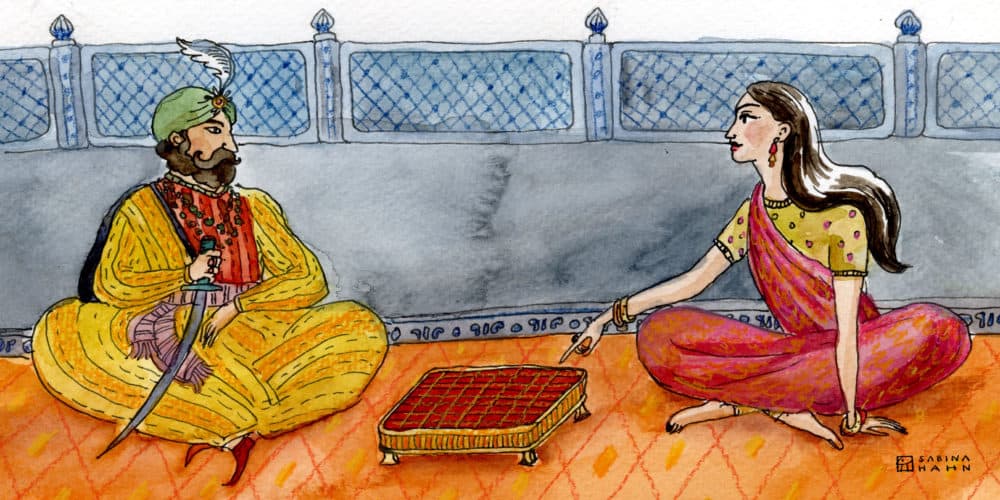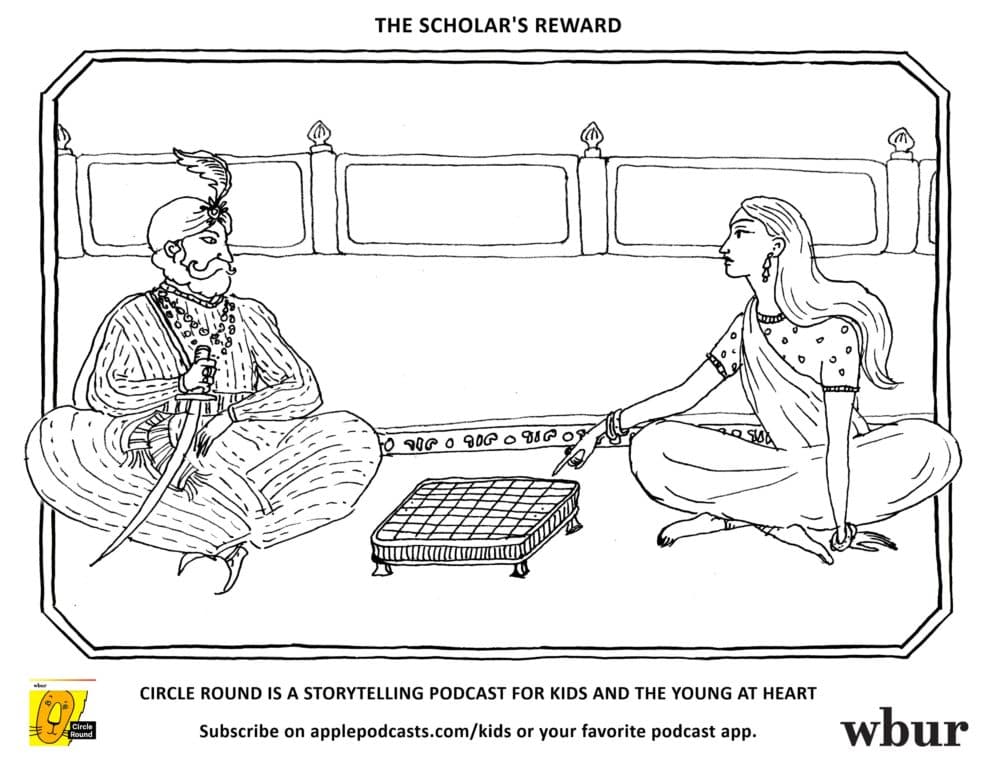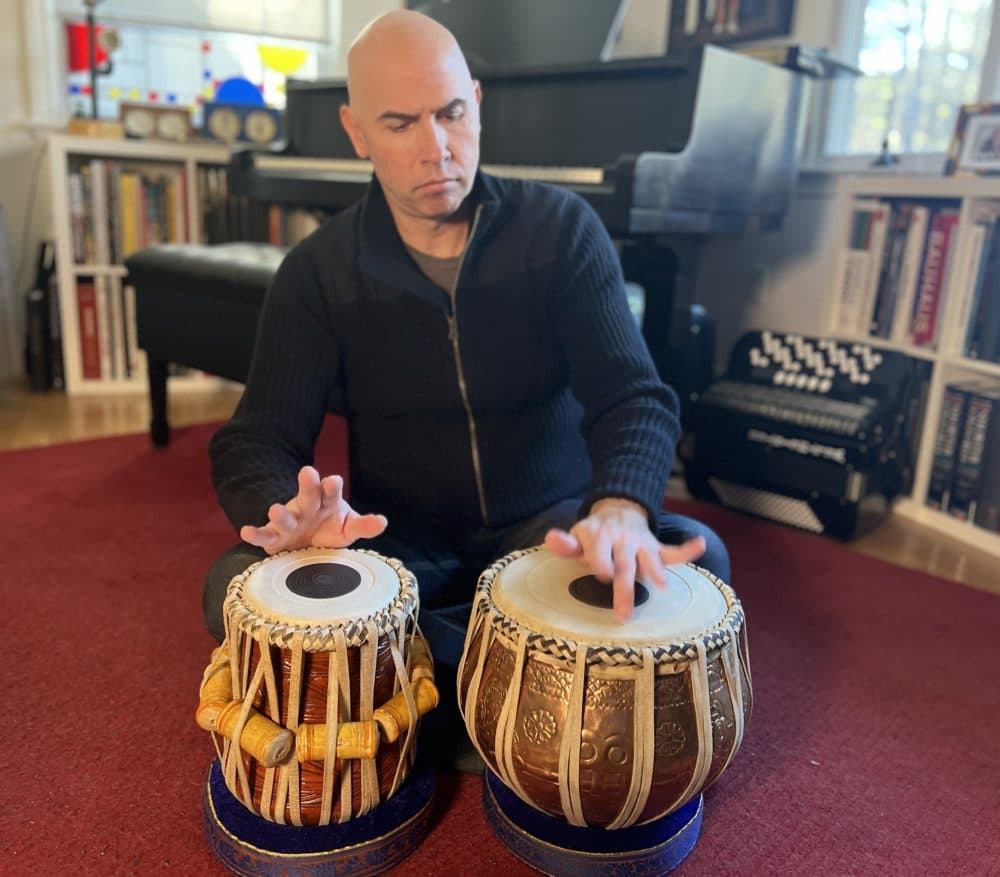Advertisement
The Scholar’s Reward | Ep. 188
Play
Have you ever noticed what happens when you toss a pebble into a pond or lake?
First, circles appear on the surface, right? Then they ripple outward and seem to go on forever!
That’s called a "ripple effect." And as we’ll hear in today’s story, just like a little pebble can create big ripples in the water, our actions can create big ripples, too – beyond our wildest dreams.
Our story is called “The Scholar's Reward.” Versions of this tale come from the southeast Asian country of India.
Voices in this episode include Feodor Chin, Jessica Rau, Jefferson A. Russell, Summer Bishil, and Michael Maliakel. Summer Bishil stars in The Magicians on SYFY, as well as the recent indie film, Four Samosas . Michael Maliakel is starring as the title character in the hit Broadway musical, Aladdin .
This episode was adapted for Circle Round by Rebecca Sheir. It was edited by Nora Saks. Original music and sound design is by Eric Shimelonis. Our artist is Sabina Hahn.
Coloring Page

ADULTS! PRINT THIS so everyone can color while listening. We’re also keeping an album so share your picture on Facebook , Twitter , Instagram , and tag it with #CircleRound. We'd love to see it! To access all the coloring pages for past episodes, click HERE . Our resident artist is Sabina Hahn and you can learn more about her HERE .
Things To Think About After Listening
At the start of the episode we talked about a “ripple effect.” Find some paper, and some markers, crayons, or colored pencils, and get ready to draw the ripple effects of kindness.
On the left side of the paper, draw a picture of you doing an act of kindness for someone: maybe you give a friend a smile, you hold the door open for a stranger, or you help a family member with a chore. We’ll call that person Person A.
Chances are your act of kindness will make Person A feel so special, they’ll be inspired to share kindness with somebody else. So to the right of your first picture, draw Person A sharing an act of kindness with Person B. Then draw Person B sharing another act of kindness with Person C.
Your drawing can go on for as long as you’d like. How far can your first act of kindness reach? How many people are inspired to be kind? We think you’ll find that the ripple effect can go on and on!
Musical Spotlight: The Tabla

The most popular percussion instrument in all of India is the tabla: a set of two single-headed, barrel-shaped small drums of slightly different sizes and shapes (baya and daya for left and right drums, respectively).
Experts aren’t certain whether the tabla has indigenous origins in India, or whether it was brought to the country by Muslim and Mughal conquerers of the Indian subcontinent. Either way, most experts believe the name tabla comes from tabl: the Arabic word for drum.
Each drum in the tabla is made from either hollowed-out wood, clay, or metal. The smaller drum (daya) creates treble and tonal sounds, while the larger drum (baya) is lower, and produces a more bass-like sound. To play the tabla, you move your fingers and palms in various ways to create a large variety of sounds and rhythms.
Script:
NARRATOR: Long ago in India there was a raja – or king – who had an enormous palace, a massive staff of servants, and a colossal obsession… with war.
RAJA: Oh, how I love the thrill of battle! The excitement of attack! The exhilaration of sending my army to invade other lands!
NARRATOR: And from the comfort of his ‘enormous palace,’ the raja was always ‘sending his army to invade other lands.’
And what an army it was! In those days, the army consisted of four divisions, or arms. First, there was the infantry … the foot soldiers who marched into battle.
Then, there were the elephants. Yes! Elephants! Massive, lumbering animals whose mighty, trumpeting call struck fear in the hearts of the enemy.
After the elephants came the charioteers … the brave soldiers who rolled in on swift, horse-drawn chariots.
And after the charioteers came the cavalry … the gallant riders who galloped into battle on horseback.
All four divisions were led by a general, who was personally appointed by the raja himself.
But here’s the thing.
Not even the general approved of the raja’s warring ways! In fact, no one in the kingdom did! Everyone had grown weary of the raja’s never-ending invasions – including his own advisors… who called a private meeting, to see what could be done.
ADVISOR 1: My fellow advisors! We must find a way to end the raja’s obsession with war!
ADVISOR 2: Indeed! The people in these lands we’re invading – they’ve done nothing wrong!
ADVISOR 3: Yet so many villages, towns, and cities have been destroyed!
ADVISOR 1: So many lives have been lost!
ADVISOR 2: And not just soldiers’ lives, but the lives of everyday citizens!
ADVISOR 3: Think of all the destruction!
ADVISOR 1: Think of all the family and friends left behind!
ADVISOR 2: It’s incredible how much devastation one war can cause.
ADVISOR 3: But how can we get the raja to understand that?
NARRATOR: While the advisors were puzzling over what to do, a stranger arrived at the palace.
In one hand, she carried a leather case. In the other, she carried a drawstring purse. She told the advisors she was a scholar from a land far, far away...
SCHOLAR: … and I have traveled many, many miles to your kingdom because I know how to end the raja’s obsession with war! All I ask is that I may meet with the raja privately… so I may give him a special gift.
NARRATOR: As you can imagine, the advisors were very excited to meet someone who might end the raja’s warring ways.
So they wasted no time escorting the scholar to the raja’s chamber: an opulent room with polished marble floors, glittering chandeliers, and a fancy table inlaid with gold. Seated at the table, studying a colorful map of all the surrounding countries, was the raja.
RAJA: Oh! Greetings, advisors! I was just searching this map to see which land I should invade next! But who have we here? A guest?
NARRATOR: The scholar bowed.
SCHOLAR: Indeed, Your Majesty. I am a scholar who has traveled long and far to bring you a special gift. May I show it to you? In private?
NARRATOR: The raja pushed his map aside.
RAJA: Of course! Come! Sit down with me, scholar, and show me your gift! Advisors? You may be dismissed.
NARRATOR: The advisors hurried from the room as the scholar sat down at the table, across from the raja. Then she reached into her leather case and pulled out…
RAJA: … A board?!? You’re giving me a board?!?
SCHOLAR: Not just any board, Your Majesty! Do you see how it’s painted with a checkered pattern of sixty-four black and white squares?
RAJA: Yes…?
SCHOLAR: Well, on those squares, you place… these.
NARRATOR: The scholar reached into her drawstring purse. One by one, she plucked out an assortment of hand-carved pieces. Half of the pieces were black, and half were white.
The raja watched with curiosity as the scholar lined up the black pieces on one side of the board, and the white pieces on the other.
RAJA: I must say, scholar… these pieces are very beautiful! Such intricate carvings! But the pieces, the board… what are they for?
SCHOLAR: I’m glad you asked, Your Excellency! The pieces, the board… they are for waging war.
NARRATOR: The raja shook his head.
RAJA: But I’m already waging war! All the time! There’s rarely a moment I’m not sending my entire army into battle. The infantry! The elephants! The charioteers! The cavalry!
SCHOLAR: I understand that, Your Highness. But these pieces, this board, they will allow you to wage war any time you’d like – as often as you’d like – without sending a single foot soldier, elephant, charioteer, or cavalryman into the fray!
RAJA: But that’s impossible!
SCHOLAR: It is not, Your Majesty! You see, this board and these pieces – they’re part of a new game I’ve invented. And if you play this game wisely, you can march into battle any time you want. You just have to trust me.
[Theme music in]
NARRATOR: This new game the scholar has brought – what do you think it is?
And will it really help the raja wage war… without actually going to battle?
We’ll find out… after a quick break.
[Theme music out]
[SPONSOR BREAK]
[Theme music in]
NARRATOR: Welcome back to Circle Round. I’m Rebecca Sheir. Today our story is called “The Scholar's Reward.”
[Theme music out]
NARRATOR: Before the break, a powerful raja was constantly invading other lands – much to the dismay of everyone in his kingdom.
Then a mysterious scholar arrived, who said she could stop the raja from waging war. She presented the raja with a new game, played with black-and-white pieces on a black-and-white checkered board.
The scholar explained to the raja that in the game, the board was a symbol… for the battlefield.
SCHOLAR: And to play the game, Your Majesty, you move the pieces around the battlefield! Each player starts on their side of the board, then they move across, as if marching off to war!
NARRATOR: The mere mention of ‘battlefields’ and ‘war’ had the raja intrigued.
RAJA: Hmmmm… Tell me more!
NARRATOR: The scholar pointed to a tall game piece, topped with a beautifully-carved crown.
SCHOLAR: This piece represents you, Your Majesty. It is the raja, the king. And this piece…
NARRATOR: She pointed to the next piece over.
SCHOLAR: … This piece represents the general.
NARRATOR: Now she gestured toward a series of smaller pieces, all identical and lined up in a row.
SCHOLAR: These pieces represent the infantry: the foot soldiers who march on the front lines. As for the rest of the pieces… these are the elephants… these are the charioteers… and these pieces in the corners of the board, they are the cavalry.
NARRATOR: The raja’s eyes and face lit up.
RAJA: My army! All four divisions! They’re all on this board!
SCHOLAR: That’s right, Your Highness! Both players have their own armies, in the form of these pieces! They take turns moving their pieces across the board, in hopes of capturing their opponent’s pieces. And whoever succeeds in capturing the raja, the king… they win the game – and the war! Then they can reset the board and start all over again!
RAJA: It’s brilliant, scholar! Just brilliant! I love it! Let’s play a game!
NARRATOR: So… they did. The raja and the scholar played the very first game… of chess. Only back then it was called “chaturanga,” which in the Sanskrit language of India means “four limbed” or “four arms” – just like the four arms of the raja’s army!
The raja and the scholar spent the entire day playing the game. By nightfall, the raja was hooked.
RAJA: Scholar! This game you’ve taught me is marvelous! It has all the excitement and strategy of a real-life battle!
SCHOLAR: Yet none of the real-life destruction. Your Majesty, unlike in real war, where the loss of one life, or village, or town, or city can affect so many people, this game is played without violence, without devastation, without –
RAJA: Right, right. My point is, this game is amazing, and I must reward you for introducing it to me. I’ll give you anything you wish, scholar! Anything!
NARRATOR: The scholar gave the raja a long, hard look.
SCHOLAR: You’ll give me anything, Your Excellency…?
RAJA: Yes! Anything! Name it, and it’s yours!
SCHOLAR: Well in that case…I will take one grain of rice.
NARRATOR: The raja was taken aback.
RAJA: One single grain of rice!?!? Surely I can give you more than one grain of rice! That’s a measly reward for someone who’s changed my life in such a significant way!
SCHOLAR: Very well…
NARRATOR: The scholar pointed at the black-and-white checkered board.
SCHOLAR: There are sixty-four squares on this board. I would like you to give me sixty-four days’ worth of rice. But I want you to give it to me in the following fashion. On the first day, you will place one grain of rice on the first square. On the second day, you will double it, and put two grains of rice on the second square. On the third day, you will double it again, and put four grains of rice on the third square.
RAJA: And let me guess – on the fourth day, I’ll double it again? And put eight grains of rice on the fourth square?
SCHOLAR: That’s right, Your Majesty! Each day you will double the amount of rice you give me … all the way until the sixty-fourth day, and the sixty-fourth square.
NARRATOR: The raja gazed at the scholar. Then, he slapped his knee and let out a laugh.
RAJA: Oh come now, scholar! Even if you double the rice every single day, on the sixty-fourth day you’re bound to get little more than a cup! If not less! Is that really all you want for teaching me this brilliant battle game?
SCHOLAR: Yes, Your Majesty. That’s really all I want.
NARRATOR: So the raja paid a visit to the royal granary, where his staff kept the royal supply of grains like wheat, millet, and, yes, rice.
And on the first day, the raja presented the scholar with…
RAJA: One grain of rice!
SCHOLAR: Thank you, Your Majesty!
NARRATOR: On the second day, the raja presented the scholar with…
RAJA: Two grains of rice!
SCHOLAR: Thank you, Your Majesty!
NARRATOR: On the third day, the raja presented the scholar with…
RAJA: Four grains of rice!
SCHOLAR: Thank you, Your Majesty!
NARRATOR: On the fourth day, the raja presented the scholar with…
RAJA: Eight grains of rice!
SCHOLAR: Thank you, Your Majesty!
NARRATOR: And on the fifth day, the raja presented the scholar with… well, why don’t you figure it out?
On the fourth day, it was eight grains of rice. So what’s double that?
You guessed it!
RAJA: Sixteen grains of rice!
SCHOLAR: Thank you, Your Majesty!
NARRATOR: Fast-forward to the eighth day –the end of the first row on the board. And on that eighth day, the raja presented the scholar with…
RAJA: One-hundred-twenty-eight grains of rice!
SCHOLAR: Thank you, Your Majesty!
NARRATOR: The raja asked the royal treasurer to do the math… and add the one-hundred-twenty-eight grains of rice to all the grains of rice the scholar had received so far. And when the total came back, it was a mere:
RAJA: 255!?? Eight entire squares and eight entire days and all I’ve given out is 255 grains of rice? Hmmmm… This woman may call herself a scholar, but I’m beginning to believe she’s a fool! With this doubling scheme of hers, the rice is barely adding up!
NARRATOR: Well, little did he know what was to come!
By the end of the first row on the board, the scholar had received a total of 255 grains of rice, right?
Well, by the end of the second row, she had received a total of…
RAJA: …over 65-thousand grains of rice???!!!
NARRATOR: By the end of the third row, she had received a total of…
RAJA: …over 16-million grains of rice???!!!
NARRATOR: And by the end of the fourth row, she had received a total of…
RAJA: …over 4-billion grains of rice???!!! We’re only halfway through the board, and the royal granary is nearly empty! I don’t know how I’ll make it through the next four rows and next thirty-two days! Hmmm. Perhaps that scholar isn’t a fool. One grain of rice has grown very great! Very great, indeed!
NARRATOR: And yet, that one grain still had a lot of multiplying to do.
The raja had the royal treasurer do even more math. And by her calculations, on the sixty-fourth day, and the sixty-fourth square, the raja would have to present the scholar with a grand total of…
RAJA: …nine quintillion, two hundred twenty-three quadrillion, three hundred seventy-two trillion, thirty-six billion, eight hundred fifty-four million, seven hundred seventy-five thousand, eight hundred and eight grains of rice! There’s not nearly that much rice in the royal granary – let alone in this entire country!
NARRATOR: The raja’s heart fell. For he knew he had no choice but to go back on his promise and tell the scholar he could not fulfill her reward.
But when he did, she wasn't the least bit surprised!
SCHOLAR: Of course you can’t fulfill my reward, Your Majesty! On the sixty-fourth day alone, you would owe me nine quintillion, two hundred twenty-three quadrillion, three hundred seventy-two trillion, thirty-six billion –
RAJA: I know! I know! Or at least now I know. When we started this whole experiment, I had no idea what a major effect one grain of rice could have!
SCHOLAR: Just as you had no idea what a major effect one war would have. Or two… or four… or eight… or sixteen…
NARRATOR: All of a sudden, the raja understood everything. For the first time, the far-reaching consequences of his war-happy actions became crystal-clear.
RAJA: Oh! My dear, dear woman! How did I not see it before? The wars I waged – the many, many wars! They led to such devastation! Such loss! Far beyond anything I could comprehend! Until now.
NARRATOR: And so… thanks to the scholar’s wisdom… the raja gave up his obsession with war, and he never attacked another land again. What’s more, he invited the scholar to become his chief advisor, so he could rely on her wise counsel, each and every day.
And when she wasn’t counseling him, she was sitting across from him, as the pair played their favorite game. They took turns moving their black-and-white pieces on a black-and-white-checkered board with eight rows, sixty-four squares, and nearly infinite possibilities.
